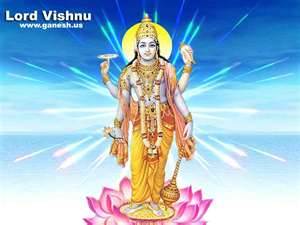"Vishnu Puranam" : Lakshmi-
Lakshmi Brahma also wanted to create a son who would be just like him. When he thought of this, a son appeared on his lap. But the child kept on crying (rud) and thus came to be known as Rudra. He was crying because he did not have a name. The crying stopped when Brahma gave him the name of Rudra from the word for crying. The child, however, began to cry once more and did not stop until he was given another name. This happened seven times. And so Rudra also has the names of Bhava, Sarva, Mahesha, Pashupati, Bhima, Ugra and Mahadeva. Rudra’s wife was called Sati. She gave up her life because of what her father Daksha had done and was born again as Uma, the daughter of Himalaya and Menaka. Mahadeva married Uma yet again. There was a sage called Durvasa who was descended from Mahadeva. Once upon a time, Durvasa was wandering around the world. And in the hands of a pretty woman he saw a beautiful and fragrant garland. Durvasa wanted the woman to giv...




Comments
Post a Comment